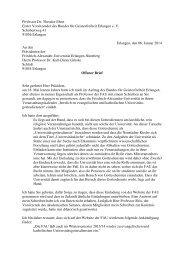Globalisierung - Realität und Ideologie.pdf - FEN
Globalisierung - Realität und Ideologie.pdf - FEN
Globalisierung - Realität und Ideologie.pdf - FEN
Erfolgreiche ePaper selbst erstellen
Machen Sie aus Ihren PDF Publikationen ein blätterbares Flipbook mit unserer einzigartigen Google optimierten e-Paper Software.
13<br />
are environmental protection, economic growth and social equity. The SI emphasises that if sustainable<br />
development is to be successful there will have to be a change in attitude on the part of both individuals and<br />
governments with regard to current lifestyles and the impact they have on the environment.<br />
A global strategy for sustainable development has no prospect of success unless it balances the interests<br />
between developing and developed countries. Development and economic growth must be much less at the<br />
expense of natural resources, in particular the non renewable, and the environment than in the 20th century.<br />
Growth and progress should now be inexorably linked with natural balance and sustainability.<br />
The 1992 UN Conference on Environment and Development in Rio set the stage for a new global agenda,<br />
the Agenda 21, focusing on various aspects of global sustainability. The World Summit on Sustainable<br />
Development in Johannesburg 2002 contributed to the implementation of the Agenda 21. But its results are<br />
far from what the SI is aiming for. It has clearly shown the limits of the current institutional framework in<br />
getting a new global deal <strong>und</strong>er way. There is a striking contrast between the problems the world faces and<br />
its system of governance.<br />
Hence there is a need to establish a new United Nations Security Council on Economic, Social and<br />
Environmental issues – a Council for Sustainable Development – for the purposes of global co-ordination.<br />
1. So<strong>und</strong> Environment Policy<br />
A so<strong>und</strong> environment is the indispensable basis for economic development and the enhancement of welfare<br />
and the quality of life in all parts of the world.<br />
The 1992 UN Summit in Rio increased global awareness of the importance of global environmental policy,<br />
but the promising signals sent out from Rio failed to materialise. The global environmental problems have got<br />
even worse.<br />
The developed countries are called upon to change their patterns of consumption and production, but<br />
developing countries have a responsibility of their own to bear, too.<br />
Global environmental problems are caused by the growth in world population, the increasing consumption of<br />
goods and resources, short-term economic targets and the essential search for profit that leads to a<br />
dangerous waste of natural resources.<br />
The outlines of a global environmental policy have emerged which begin with individual ecological media.<br />
a) If the climate challenge is to be tackled successfully the world must rely on conservation, use less nonrecyclable<br />
and more renewable energy. The huge potential to be tapped by increasing energy productivity is<br />
the core answer to the climate challenge.<br />
b) Global warming is the greatest threat to the environment. Global efforts to combat global warming rest on<br />
the United Nations Framework on Climate Change. The Kyoto Agreement was reached as part of this<br />
Framework. Ratification of the Kyoto Protocol by all the players involved remains a central objective of the<br />
SI.<br />
c) Environmental policy needs to focus on the consistent avoidance of waste and the development of a<br />
materials management system on a global level. As consumers and producers, carers for their families and<br />
educators, women play an important role in avoiding waste and promoting sustainable development.<br />
d) Global environmental policy on the elimination of dangerous chemicals has concentrated up to now on<br />
chlorofluorocarbons and persistent organic pollutants. The Montreal Protocol has achieved a total stop in the<br />
production and use of ozone-damaging chemicals. It implements North-South priority.<br />
Persistent organic pollutants are used as pesticides. A world chemical policy, stimulated by the Agenda 21,<br />
was brought about in 2001 in the Stockholm Agreement. Its essence is the prohibition of twelve particularly<br />
dangerous pollutants. Since new and potentially highly dangerous pollutants are constantly being developed,<br />
more effective steps are required as part of the Stockholm Agreement.<br />
e) The complexity of biodiversity as a global object of protection entails a focus on several targets:<br />
stocktaking of biological diversity, conservation of particularly sensitive regions and benefit sharing in the<br />
exploitation of genetic resources.
















